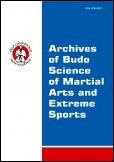2022, Volume 18, Issue 1
Analysis of karate training for people with mental disabilities
Kazimierz Witkowski1, Aleksandra Glapa1
1Wroclaw University of Health and Sport Sciences, Wrocław, Poland
Author for correspondence: Kazimierz Witkowski; Wroclaw University of Health and Sport Sciences, Wrocław, Poland; email: kazmierz.witkowski@awf.wroc.pl
Full text
Abstract
Background and Study Aim: Regular physical activity by mentally disabled people can contribute to their better functioning in society. Karate training through its comprehensive psychomotor emphasis can complement rehabilitation and therapeutic activities. Therefore, the aim was to analyze karate training for people with mental disabilities in order to develop a universal pattern of activities for them.
Material and Methods: A two-week covert observation of karate classes was conducted on 4 mentally disabled 19-year-olds: 2 from kyokushin karate (a woman with Down syndrome and a man with Asperger syndrome) and 2 from shotokan karate (a man with Down syndrome and a man with Asperger syndrome).
Results: Three universal karate class schemes have been developed - for people with Down syndrome, with Asperger syndrome, and inclusive classes for able bodied people and mentally disabled people. The proposed schemes maximize the training effects of the mentally disabled and fully fit into the karate culture.
Conclusions: It is recommended to conduct karate classes for mentally disabled people based on the developed schemes. The presented schemes of karate classes are characterized by high effectiveness.
Key words: karate culture, Down syndrome, Asperger’s syndrome, martial arts, innovative agonology





